|
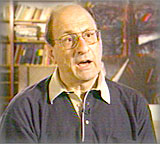 JOSE
ZALAQUETT: Well, as you said, it is very difficult to compare human
rights violations. But you may advance certain criteria. First, the
importance of the rights being violated. Certainly killing or torturing
someone is graver than censorship, grave as censorship might be. In
one case, you're depriving them of the right to life or physical integrity,
in the other, of the very important right to freedom of expression,
but not as critical as right to life or physical integrity. Then, a
second factor is, to what extent is this systematic and massive? Numbers
are not so critical to assess the systematic nature or the massive nature.
… JOSE
ZALAQUETT: Well, as you said, it is very difficult to compare human
rights violations. But you may advance certain criteria. First, the
importance of the rights being violated. Certainly killing or torturing
someone is graver than censorship, grave as censorship might be. In
one case, you're depriving them of the right to life or physical integrity,
in the other, of the very important right to freedom of expression,
but not as critical as right to life or physical integrity. Then, a
second factor is, to what extent is this systematic and massive? Numbers
are not so critical to assess the systematic nature or the massive nature.
…
Chile was a democratic country. The rule of law was upheld. For us
to have not only a breakdown of democracy and a dictatorship coming
in, but then from the top command an order to arrest people in the dead
of night under curfew, to take them to secret places and then to execute
them and then to deny the facts all along, that is in itself a monstrous
crime, a crime against humanity. And the numbers, whether 3,000, or
in other countries 20,000, and so forth, are not so critical to us as
the enormity of the crime. …
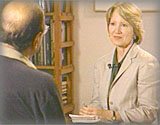 ELIZABETH
FARNSWORTH: Do you have a figure that you use for how many people were
affected by the repression? I mean directly, imprisoned? … ELIZABETH
FARNSWORTH: Do you have a figure that you use for how many people were
affected by the repression? I mean directly, imprisoned? …
JOSE ZALAQUETT: Well, there are, as you said, 3,200 people who lost
their lives, whether they were killed or made to disappear, namely they
were killed and buried in secrecy, but they were killed nevertheless.
People who spent from one night to several years in prison -- some time
in prison for political reasons -- throughout the 17-year period it
is estimated at 200,000. Of course, many of them spent only a few days
in prison. But throughout the 17-year period, such a large number of
people at least spent the night at the police prison or several weeks
or several years.
ELIZABETH FARNSWORTH: For political reasons.
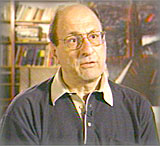 JOSE
ZALAQUETT: Yes. It is estimated that some 40-50 percent of those suffered
from either torture or ill-treatment of one kind or another. So that
gives you a figure of tens of thousands of people who were either tortured
or ill-treated. Then, the number of people who were banned from the
country is probably in the 20,000 figure. Many thousands more, maybe
many hundreds of thousands more left the country fearing persecution…
Tens of thousands of people were expelled from civil service because
of their political persuasion. There were civil servants who were summarily
dismissed. Thousands of people were expelled from university faculties
or, as students, they were expelled from universities. They were not
allowed to finish their studies. Political parties, unions, newspapers
that were considered dissident were closed down. Congress was closed
down. Their literal walls were burned down. A curfew was imposed for
12 out of 17 years of the military rule. You could not step out of your
home after a certain hour in the night without risking being shot if
you didn't hear the command to halt. This was the situation for 17 years
of military rule… JOSE
ZALAQUETT: Yes. It is estimated that some 40-50 percent of those suffered
from either torture or ill-treatment of one kind or another. So that
gives you a figure of tens of thousands of people who were either tortured
or ill-treated. Then, the number of people who were banned from the
country is probably in the 20,000 figure. Many thousands more, maybe
many hundreds of thousands more left the country fearing persecution…
Tens of thousands of people were expelled from civil service because
of their political persuasion. There were civil servants who were summarily
dismissed. Thousands of people were expelled from university faculties
or, as students, they were expelled from universities. They were not
allowed to finish their studies. Political parties, unions, newspapers
that were considered dissident were closed down. Congress was closed
down. Their literal walls were burned down. A curfew was imposed for
12 out of 17 years of the military rule. You could not step out of your
home after a certain hour in the night without risking being shot if
you didn't hear the command to halt. This was the situation for 17 years
of military rule…
|
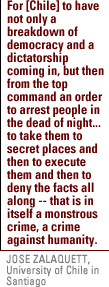 |
|
ELIZABETH FARNSWORTH: What do you think was most important, considering
the history of Chile, about this most recent election? [Ricardo Lagos,
of the Socialist Party, was elected president in January and inaugurated
March 11. His opponent was center-right candidate Joaquin Lavin.]
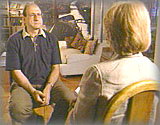 JOSE
ZALAQUETT: People wanted to leave the past behind but not just to forget
it. On the one hand after 27 years had passed after the coup d'etat
of 1973, they really wanted to move ahead. Into the 21st century, into
normal issues, such as employment, inflation, progress, and so forth.
To security, crime, normal issues of any democracy. On the other hand,
I think that people knew that you cannot move ahead and leave the past
completely unattended. You have to close it down in one way or another.
That's why both candidates made an explicit effort, on the one hand,
not to mention Pinochet, on the other hand, to assert that human rights
have got to be respected and that everybody was answerable before the
Chilean courts. I think that these themes played one, by omission and
the other, because it was explicitly put in the agenda of both candidates,
played a prominent role in the campaign. JOSE
ZALAQUETT: People wanted to leave the past behind but not just to forget
it. On the one hand after 27 years had passed after the coup d'etat
of 1973, they really wanted to move ahead. Into the 21st century, into
normal issues, such as employment, inflation, progress, and so forth.
To security, crime, normal issues of any democracy. On the other hand,
I think that people knew that you cannot move ahead and leave the past
completely unattended. You have to close it down in one way or another.
That's why both candidates made an explicit effort, on the one hand,
not to mention Pinochet, on the other hand, to assert that human rights
have got to be respected and that everybody was answerable before the
Chilean courts. I think that these themes played one, by omission and
the other, because it was explicitly put in the agenda of both candidates,
played a prominent role in the campaign.
ELIZABETH FARNSWORTH: What do you hope for from Lagos? What do you
think he ought to do about these human rights issues?
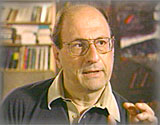 JOSE
ZALAQUETT: A number of things have been done but two remain yet to be
done. One is to make a serious effort to account for the whereabouts
of 1,000 people "disappeared". These were people arrested
by the military authorities, killed, and buried in secrecy. … And
the second point is to have the army to acknowledge that they did commit
human rights violations and to tell the future generations of military
men that these things will not be tolerated again… JOSE
ZALAQUETT: A number of things have been done but two remain yet to be
done. One is to make a serious effort to account for the whereabouts
of 1,000 people "disappeared". These were people arrested
by the military authorities, killed, and buried in secrecy. … And
the second point is to have the army to acknowledge that they did commit
human rights violations and to tell the future generations of military
men that these things will not be tolerated again…
ELIZABETH FARNSWORTH: Would you recommend giving immunity from prosecution
to people who come forward with information about the disappeared?
JOSE ZALAQUETT: What I would recommend is to establish a legal obligation
to tell whatever you know. And a penalty of law if you don't do so.
Now, because no one can be forced to testify against themselves, those
who comply with the legal obligation, that information you cannot use
in a trial against them. That's a basic principle that you call the
5th Amendment principle. If you force someone to testify against themselves,
on the other hand, you cannot use that information against them. This
is something that has been proposed formally in the round-table discussions
involving human rights lawyers, military men, religious leaders, and
other people.
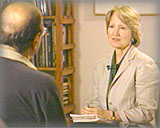 ELIZABETH
FARNSWORTH: What was the army's response? ELIZABETH
FARNSWORTH: What was the army's response?
JOSE ZALAQUETT: They're open to that idea, but they would like to see
more generous immunity terms. So, we're down to the small print. But
the general idea that we have to take serious steps, not just rhetorical
steps like calling everybody, appealing to their sense of humanity.
No, you have to take serious steps to make it legally binding for them
to testify. In exchange for that, those who so testify, they have to
enjoy immunity for that testimony. Of course, that's the basic legal
principle. But they're coming to terms with that idea. The point is
in the fine print. We haven't gotten there yet.
ELIZABETH FARNSWORTH: The danger -- according to the relatives of the
disappeared and the detained -- in what you're proposing or what could
happen, is that then these people would never be tried for what they
did to the father or mother or sister of these people.
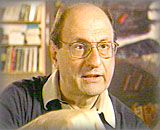 JOSE
ZALAQUETT: Well, the point is that that is the situation now. They cannot
be tried. You don't have enough evidence. And we have neither trials
nor the truth. In other words, they enjoy immunity because of an amnesty
law that the military government passed in 1978. There's not enough
evidence to know where the disappeared are. So we have to make some
choices. Either we want an ideal situation in which we know the whole
truth and everybody's prosecuted and that won't come about, or in order
to know what really happened and to find the remains of the disappeared,
you have to grant them some kind of immunity because at the same time
you're forcing them under penalty of law to testify. JOSE
ZALAQUETT: Well, the point is that that is the situation now. They cannot
be tried. You don't have enough evidence. And we have neither trials
nor the truth. In other words, they enjoy immunity because of an amnesty
law that the military government passed in 1978. There's not enough
evidence to know where the disappeared are. So we have to make some
choices. Either we want an ideal situation in which we know the whole
truth and everybody's prosecuted and that won't come about, or in order
to know what really happened and to find the remains of the disappeared,
you have to grant them some kind of immunity because at the same time
you're forcing them under penalty of law to testify.
ELIZABETH FARNSWORTH: So somebody who was tortured at Villa Grimaldi
-- is there any way to get at their torturers?
JOSE ZALAQUETT: Of course. They have every right to want it. And justice
is due to them. Only that you have to try to get the best you can out
of a difficult situation in which 27 years have passed, they have closed
ranks and they protect each other, they erected legal barriers and they
have an amnesty law. Time is passing, people are dying out. Some of
the people who ordered this are in their late 80s or they are dying.
Soon, most of the sources for the truth might be lost.
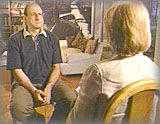 ELIZABETH
FARNSWORTH: What's the significance of the caravan of death cases, the
killings, for example, in Copiapo. Are these cases especially significant
because they come very close to General Pinochet? [The "caravan
of death" is a series of alleged kidnappings in October and November
1973 that led to the deaths of over 70 political prisoners. Several
cases are pending relating to the caravan, including the case of Gen.
Arellano Stark, who was allegedly ordered by Pinochet to "speed
up" military trials against dissidents.] ELIZABETH
FARNSWORTH: What's the significance of the caravan of death cases, the
killings, for example, in Copiapo. Are these cases especially significant
because they come very close to General Pinochet? [The "caravan
of death" is a series of alleged kidnappings in October and November
1973 that led to the deaths of over 70 political prisoners. Several
cases are pending relating to the caravan, including the case of Gen.
Arellano Stark, who was allegedly ordered by Pinochet to "speed
up" military trials against dissidents.]
JOSE ZALAQUETT: They are significant for a number of reasons. First,
the head of the caravan of death, General Arellano, has not denied the
crimes. He's denying his own responsibility. So there is absolute admission
and clear evidence that these people were killed in cold blood. It's
a very well documented case. The commander of that operation is simply
denying his responsibility, not the facts. Secondly, the judiciary have
said that the people who were killed and then buried in secrecy after
the caravan of death passed through a particular town, city … should
be considered still abducted.... And since abduction continues to be
a crime every day you remain abducted, these cases can never be closed
until you can date the death. And for the death to be dated they have
to either find the remains or acknowledge their crimes fully. So they're
put in a very difficult situation. Either they confess to their crimes
or the cases remain open against them. That's the significance…
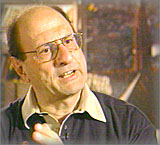 Actually,
there is no doubt in my mind that he [General Arrellano Stark] ordered
the whole operation of the caravan of death. Maybe General Arellano
was trapped to some extent in the sense that the secret police people
that were going in his own caravan, carried special orders But he certainly
cannot claim that he didn't know after the first stop what these orders
were. The orders were to kill people and he cannot claim that he went
for another three or four stops killing people remaining ignorant of
what his subordinates, whatever the special orders they carried, were
doing. So at least he condoned those crimes. At worst, he ordered them.
But there's no doubt in my mind that General Contreras who would later
on become head of DINA [the Secret Police] orchestrated this caravan
of death. Whether with the accomplice or not of General Arellano and
that the top order came from Pinochet. Actually,
there is no doubt in my mind that he [General Arrellano Stark] ordered
the whole operation of the caravan of death. Maybe General Arellano
was trapped to some extent in the sense that the secret police people
that were going in his own caravan, carried special orders But he certainly
cannot claim that he didn't know after the first stop what these orders
were. The orders were to kill people and he cannot claim that he went
for another three or four stops killing people remaining ignorant of
what his subordinates, whatever the special orders they carried, were
doing. So at least he condoned those crimes. At worst, he ordered them.
But there's no doubt in my mind that General Contreras who would later
on become head of DINA [the Secret Police] orchestrated this caravan
of death. Whether with the accomplice or not of General Arellano and
that the top order came from Pinochet.
|
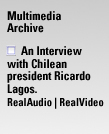 |
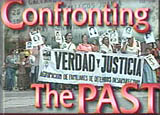


 JOSE
ZALAQUETT: Well, as you said, it is very difficult to compare human
rights violations. But you may advance certain criteria. First, the
importance of the rights being violated. Certainly killing or torturing
someone is graver than censorship, grave as censorship might be. In
one case, you're depriving them of the right to life or physical integrity,
in the other, of the very important right to freedom of expression,
but not as critical as right to life or physical integrity. Then, a
second factor is, to what extent is this systematic and massive? Numbers
are not so critical to assess the systematic nature or the massive nature.
…
JOSE
ZALAQUETT: Well, as you said, it is very difficult to compare human
rights violations. But you may advance certain criteria. First, the
importance of the rights being violated. Certainly killing or torturing
someone is graver than censorship, grave as censorship might be. In
one case, you're depriving them of the right to life or physical integrity,
in the other, of the very important right to freedom of expression,
but not as critical as right to life or physical integrity. Then, a
second factor is, to what extent is this systematic and massive? Numbers
are not so critical to assess the systematic nature or the massive nature.
…  ELIZABETH
FARNSWORTH: Do you have a figure that you use for how many people were
affected by the repression? I mean directly, imprisoned? …
ELIZABETH
FARNSWORTH: Do you have a figure that you use for how many people were
affected by the repression? I mean directly, imprisoned? … JOSE
ZALAQUETT: Yes. It is estimated that some 40-50 percent of those suffered
from either torture or ill-treatment of one kind or another. So that
gives you a figure of tens of thousands of people who were either tortured
or ill-treated. Then, the number of people who were banned from the
country is probably in the 20,000 figure. Many thousands more, maybe
many hundreds of thousands more left the country fearing persecution…
Tens of thousands of people were expelled from civil service because
of their political persuasion. There were civil servants who were summarily
dismissed. Thousands of people were expelled from university faculties
or, as students, they were expelled from universities. They were not
allowed to finish their studies. Political parties, unions, newspapers
that were considered dissident were closed down. Congress was closed
down. Their literal walls were burned down. A curfew was imposed for
12 out of 17 years of the military rule. You could not step out of your
home after a certain hour in the night without risking being shot if
you didn't hear the command to halt. This was the situation for 17 years
of military rule…
JOSE
ZALAQUETT: Yes. It is estimated that some 40-50 percent of those suffered
from either torture or ill-treatment of one kind or another. So that
gives you a figure of tens of thousands of people who were either tortured
or ill-treated. Then, the number of people who were banned from the
country is probably in the 20,000 figure. Many thousands more, maybe
many hundreds of thousands more left the country fearing persecution…
Tens of thousands of people were expelled from civil service because
of their political persuasion. There were civil servants who were summarily
dismissed. Thousands of people were expelled from university faculties
or, as students, they were expelled from universities. They were not
allowed to finish their studies. Political parties, unions, newspapers
that were considered dissident were closed down. Congress was closed
down. Their literal walls were burned down. A curfew was imposed for
12 out of 17 years of the military rule. You could not step out of your
home after a certain hour in the night without risking being shot if
you didn't hear the command to halt. This was the situation for 17 years
of military rule… JOSE
ZALAQUETT: People wanted to leave the past behind but not just to forget
it. On the one hand after 27 years had passed after the coup d'etat
of 1973, they really wanted to move ahead. Into the 21st century, into
normal issues, such as employment, inflation, progress, and so forth.
To security, crime, normal issues of any democracy. On the other hand,
I think that people knew that you cannot move ahead and leave the past
completely unattended. You have to close it down in one way or another.
That's why both candidates made an explicit effort, on the one hand,
not to mention Pinochet, on the other hand, to assert that human rights
have got to be respected and that everybody was answerable before the
Chilean courts. I think that these themes played one, by omission and
the other, because it was explicitly put in the agenda of both candidates,
played a prominent role in the campaign.
JOSE
ZALAQUETT: People wanted to leave the past behind but not just to forget
it. On the one hand after 27 years had passed after the coup d'etat
of 1973, they really wanted to move ahead. Into the 21st century, into
normal issues, such as employment, inflation, progress, and so forth.
To security, crime, normal issues of any democracy. On the other hand,
I think that people knew that you cannot move ahead and leave the past
completely unattended. You have to close it down in one way or another.
That's why both candidates made an explicit effort, on the one hand,
not to mention Pinochet, on the other hand, to assert that human rights
have got to be respected and that everybody was answerable before the
Chilean courts. I think that these themes played one, by omission and
the other, because it was explicitly put in the agenda of both candidates,
played a prominent role in the campaign.  JOSE
ZALAQUETT: A number of things have been done but two remain yet to be
done. One is to make a serious effort to account for the whereabouts
of 1,000 people "disappeared". These were people arrested
by the military authorities, killed, and buried in secrecy. … And
the second point is to have the army to acknowledge that they did commit
human rights violations and to tell the future generations of military
men that these things will not be tolerated again…
JOSE
ZALAQUETT: A number of things have been done but two remain yet to be
done. One is to make a serious effort to account for the whereabouts
of 1,000 people "disappeared". These were people arrested
by the military authorities, killed, and buried in secrecy. … And
the second point is to have the army to acknowledge that they did commit
human rights violations and to tell the future generations of military
men that these things will not be tolerated again… ELIZABETH
FARNSWORTH: What was the army's response?
ELIZABETH
FARNSWORTH: What was the army's response?  JOSE
ZALAQUETT: Well, the point is that that is the situation now. They cannot
be tried. You don't have enough evidence. And we have neither trials
nor the truth. In other words, they enjoy immunity because of an amnesty
law that the military government passed in 1978. There's not enough
evidence to know where the disappeared are. So we have to make some
choices. Either we want an ideal situation in which we know the whole
truth and everybody's prosecuted and that won't come about, or in order
to know what really happened and to find the remains of the disappeared,
you have to grant them some kind of immunity because at the same time
you're forcing them under penalty of law to testify.
JOSE
ZALAQUETT: Well, the point is that that is the situation now. They cannot
be tried. You don't have enough evidence. And we have neither trials
nor the truth. In other words, they enjoy immunity because of an amnesty
law that the military government passed in 1978. There's not enough
evidence to know where the disappeared are. So we have to make some
choices. Either we want an ideal situation in which we know the whole
truth and everybody's prosecuted and that won't come about, or in order
to know what really happened and to find the remains of the disappeared,
you have to grant them some kind of immunity because at the same time
you're forcing them under penalty of law to testify. ELIZABETH
FARNSWORTH: What's the significance of the caravan of death cases, the
killings, for example, in Copiapo. Are these cases especially significant
because they come very close to General Pinochet? [The "caravan
of death" is a series of alleged kidnappings in October and November
1973 that led to the deaths of over 70 political prisoners. Several
cases are pending relating to the caravan, including the case of Gen.
Arellano Stark, who was allegedly ordered by Pinochet to "speed
up" military trials against dissidents.]
ELIZABETH
FARNSWORTH: What's the significance of the caravan of death cases, the
killings, for example, in Copiapo. Are these cases especially significant
because they come very close to General Pinochet? [The "caravan
of death" is a series of alleged kidnappings in October and November
1973 that led to the deaths of over 70 political prisoners. Several
cases are pending relating to the caravan, including the case of Gen.
Arellano Stark, who was allegedly ordered by Pinochet to "speed
up" military trials against dissidents.] Actually,
there is no doubt in my mind that he [General Arrellano Stark] ordered
the whole operation of the caravan of death. Maybe General Arellano
was trapped to some extent in the sense that the secret police people
that were going in his own caravan, carried special orders But he certainly
cannot claim that he didn't know after the first stop what these orders
were. The orders were to kill people and he cannot claim that he went
for another three or four stops killing people remaining ignorant of
what his subordinates, whatever the special orders they carried, were
doing. So at least he condoned those crimes. At worst, he ordered them.
But there's no doubt in my mind that General Contreras who would later
on become head of DINA [the Secret Police] orchestrated this caravan
of death. Whether with the accomplice or not of General Arellano and
that the top order came from Pinochet.
Actually,
there is no doubt in my mind that he [General Arrellano Stark] ordered
the whole operation of the caravan of death. Maybe General Arellano
was trapped to some extent in the sense that the secret police people
that were going in his own caravan, carried special orders But he certainly
cannot claim that he didn't know after the first stop what these orders
were. The orders were to kill people and he cannot claim that he went
for another three or four stops killing people remaining ignorant of
what his subordinates, whatever the special orders they carried, were
doing. So at least he condoned those crimes. At worst, he ordered them.
But there's no doubt in my mind that General Contreras who would later
on become head of DINA [the Secret Police] orchestrated this caravan
of death. Whether with the accomplice or not of General Arellano and
that the top order came from Pinochet.